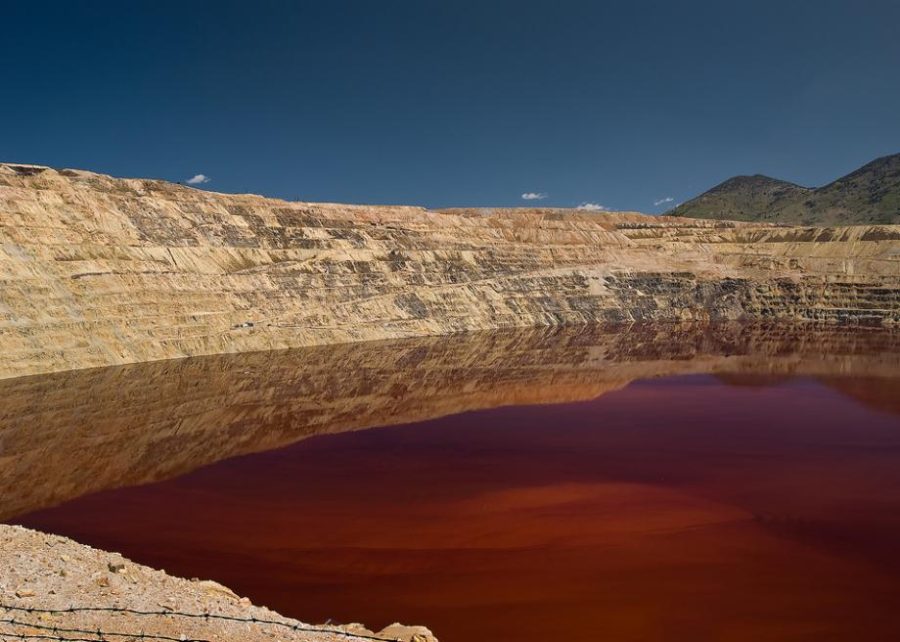Hometown Perspective: The Fall of ‘Copper City’ in Montana
The Berkeley Pit, a former open-pit copper mine, in Butte Montana is now a pit of toxic waste.
March 24, 2022
BOZEMAN, Mont. — Butte, once one of the most bustling cities in the “Big Sky States,” is now dying.
After decades of mining with a peak of almost ten thousand miners and a population of almost a hundred thousand right before World War II, this once-glorious city of copper is officially dead. It’s a city of medical scooters and oxygen tanks as the former mining town waits for a miracle cleanup.
For decades, mining waste and pollution have been dumped into the surrounding creeks and rivers, polluting the water with toxic cancer-causing waste. Residents say the issue of Butte’s water pollution has been a game of “hot potato” since the ’80s, with both the mining company and the state refusing to be accountable.
Finally, in 2019, a federal court order mandated The Atlantic Richfield Company to begin treating the Berkeley Pit — a former open pit copper mine that’s a mile long by a half-mile wide. This has since changed the water in the pit from its famous pitch-black waters to a lovely coffee brown. Locals joke that you can touch it now without losing a limb.
The Berkeley Pit contains water contaminated with over 21+ metals and minerals as well as sulfuric acid. The Pit has a pH level of between two and a half and four and a half at any given time, meaning it can support no life: It is, essentially, a vat of toxic waste.
With multiple carcinogens and poisons, the only thing keeping 85% of the groundwater safe for drinking is a sandbar around the pit at what is considered “the safe level.” The Pit Watch has remained dedicated in its observation and study of the Berkeley Pit and in making sure that the mining company keeps levels below the required maximum height of 5,410 feet. If the company fails to do this, then the EPA takes over and all mining operations must cease.
The Berkeley Pit continues to grow, even though it is more controlled now with the Pit Watch organization and the court order to filter the water as long as the mining continues. The building of a water refinement plant has helped clean the water somewhat, but as long as the mine is allowed to dump its waste, the groundwater will be at risk.
I’m from Bozeman, not Butte, and that has certainly distanced me physically from the issue, but I still have known many people from Butte and the ripple effects touch all of our lives.
Let’s begin with my experience as an athlete. The youth center in Butte is one of the best in the state, known for its high-quality pool and gym, but the way it got there is a source of contention. While not outright stated, it is an accepted fact among those of us who live in the region that the state government’s solution to its inaction in Butte was to build the town a clean swimming pool of water rather than work on the issue of the Berkeley Pit.
As a swimmer on the Bozeman High School’s team, I had many friends from Butte. One of them, Catherine, swam for the local high school and was one of the most talented swimmers I know. However, she also greatly resented Butte for its polluted and unsafe groundwater, its culture of obesity and the generational health problems she believed were related to the mines.
She ultimately committed to Ohio State for swimming as a way to escape. She has only returned to Butte on a handful of occasions since she left nearly three years ago. She is not the first to do this, either.
I think the attitude toward Butte is captured by what happened when the town was chosen to host the state championship football game in 2019. In late October, it was announced that my high school would face off on Butte’s home turf to compete for a title which we had not won in five years.
Within hours of the announcement, the Bozeman High School administration had released a statement: Any student wishing to attend this game would require parental authorization to purchase tickets. If the student was an underclassman, he or she would be required to take the school-provided bus or ride with a parent.
Upperclassmen could drive to the contest, but were linked to a map with an exact route and told to travel in large groups to avoid the east side of Butte at all costs. Along with Butte’s fascinating history comes the downfall resulting from the shiny ore.
You see, the mining families of Butte were left to suffer in poverty, and they were stuck living in the toxic wasteland they were forced to create. With the shutdown of mines came the collapse of Butte’s economy and, as a result, people who were the backbone of the economy became an unsavory crowd.
As a result, Butte has become known as one of the most dangerous cities in Montana. With a crime rating of a D-, data shows that on average a crime occurs every 6 hours or so. The route given to us by the school was specifically designed to make us avoid the perceived dangerous parts of the city. This was why many chose to not attend and instead watched the livestream from home.
My mother was especially not thrilled at the location, and my sister, whose boyfriend was on the football team, spent almost a week talking my mother into letting her go. She eventually was allowed to, but she had to either ride with the boyfriend’s family or take the bus. I drove with friends along the designated route.
If all you knew about our state was the rustic mountains towering over the plains, you would never guess the environmental issues we face. Our struggle is a small ticking time bomb, not a large natural disaster like the tornados of the Midwest, the snowstorms of the Northeast or the hurricanes of the South.
This leads us to the long awaited question: how do we fix this problem that has gone on for too long?
Put simply, it’s time for The Atlantic Richfield Company and our state government to take responsibility. This game of hot potato needs to end – they are both accountable for these horrific results. The state allowed this pollution to occur today and the mining company refused to reform its techniques and continued to battle in the courts for the right to dump the pollutants wherever they pleased.
The mining company should be forced to update its equipment and build its cleanup plant if it wishes to continue mining. The government should work to slowly drain and clean the Berkeley Pit before moving onto the groundwater supply the pit has contaminated.
Butte’s days as a shining beacon of the industrial age have come to an end, and it’s time for the mining companies to stop polluting our waters and for the Berkeley Pit to go. The Atlantic Richfield Company needs to develop new methods or stop extraction.
I’m not arguing for there to be no mining; I’m arguing for mining that doesn’t contaminate waters and destroy people’s lives. Butte can be shining again, but for now, it will remain as black as the pit’s waters until something is done to seriously turn the tide.






